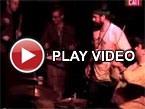Ambarchi/Fennesz/Pimmon/Rehberg/Rowe, "Afternoon Tea"
 While the artist roster reads like the authors of an academic journal, anyone who has had their nose in modern experimental/electronic music surely knows most, if not all of the participants listed. While originally issued in the early parts of this decade, this massive collaboration of guitar innovation and laptop artistry predates many of these artists' best known works and it shows that even in these salad days, these guys were (and still are) at the top of their game.
While the artist roster reads like the authors of an academic journal, anyone who has had their nose in modern experimental/electronic music surely knows most, if not all of the participants listed. While originally issued in the early parts of this decade, this massive collaboration of guitar innovation and laptop artistry predates many of these artists' best known works and it shows that even in these salad days, these guys were (and still are) at the top of their game.
With Oren Ambarchi and AMM’s Keith Rowe handling the stringed instruments and Christian Fennesz, Peter Rehberg and Paul Gough (Pimmon) manning the Powerbooks, the collaborations here show just how the organic guitars and software can co-mingle in perfect improvisation. The first two tracks, “Afternoon Tea,” parts one and two were originally issued together on CD in 2000, consisting of studio improvisations. The material is expanded here, with “No Title,” originally from a compilation, and two “Live Tea” tracks that were never before issued, and recorded live.
“Afternoon Tea Part One” begins with the more overt sounds of subtle guitar string scrapes before the subtle intrusion of digital noise begins, at an extremely restrained volume level. Eventually there arises electronic pings and phone dial tones that are simultaneously dissonant, yet have some semblance of conventional musicality to them. The combination becomes that of shrill, shimmering squeals and bassy, dark textures with a bit of rhythmic interference. By the end it is a swarm of buzzing and heavy burbling darkness, all of which is underscored by calm, relaxed guitar sounds underneath the mire.
The second part leans more heavily into noise and glitch territory, focusing on amplifier hums and unnatural chirps and burps that allow in a significant amount of digital interference and glitches. Eventually it transitions into some overt guitar playing, but even that stays on the rawer side of sound. The short “No Title” is more simplistic, with what is most likely field recordings and overdriven guitar scrapes matched with laptop ambience, the former the victor in this skirmish.
The two fully live tracks that are making their first appearance here sound no less realized than the studio improvisations, beginning with a warm digital organ drone and guitar skittering, with different but cohesive layers intermingling with one another. While there are a lot of collage elements and wobbling cuts and tones in sound, the lighter, lush drone that sounds like it is the work of Fennesz dominates the track in the best possible way. The second half puts more Eastern inspired guitar chaos over heavy, forceful electronics and matches the most conventional sounds of the album with the most unconventional: percussive thumps and guitar playing met with chaotic laptop noise, all of which dissolves into organic gauzy textures and reversed sounds, ending the disc as strongly as it started.
Considering the pedigree of the artists, anything less than a stellar set of improvisations would be significantly out of place. Even though it is nearly a decade old, the music could be recorded this year and it would be just as fresh, showing that, especially in the cases of Fennesz, Rehberg, and Gough, it is the operator, not the software (which is surely beyond obsolete by this point) that is responsible for the sound, rendering the argument that anyone with a laptop can make beautiful sounds a moot one.
samples:



